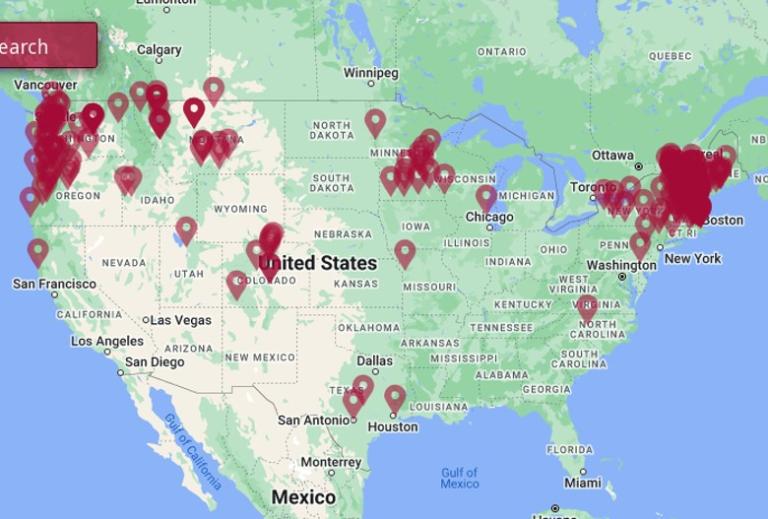Jasper Kenzo Sundeen of the Yakima Herald-Republic offered a good overview of what life is like for the 13% of Yakima County residents who live in manufactured — or “mobile” — homes: “Costs and stress mount in some Yakima County mobile home parks.”
Sundeen also introduces us to Elva Simmons, who stumbled into her role as a volunteer with the Association of Manufactured Home Owners at age 72. You’ll want to read the article just to meet Simmons. “The stories I hear are horrid,” she says. “They’re taking severe, severe advantage of people.”
Sundeen does a nice job of laying out why these home owners are especially vulnerable to exploitation — how the model of “mobile home parks” is structured to make their lives precarious:
Residents of mobile home parks own the homes themselves, but not the land in the parks. In the past, mobile homes have been a source of low-income housing; spaces in mobile home courts or parks often cost less than apartments or houses but can increase in value if well-maintained.
However, residents’ position as both homeowners and renters can make them vulnerable.
“They’re not mobile, that’s a misnomer,” said Ishbel Dickens, a Washington-based volunteer and former lawyer and head of the National Manufactured Home Association.
Some homes are too old or too expensive to move – it can cost thousands of dollars – and it can be difficult to find somewhere to move them to, Dickens said.
Tate said 80% of mobile homes aren’t moved. That means mobile homeowners can be stuck trying to hold on to a home they’ve paid thousands of dollars for while facing increasing monthly costs.
“It’s like having a rental complex that people can’t move out of,” Tate said.
That’s the basic dynamic, the market failure inherent in this model. Moving out of your apartment is a hassle, burden, and expense, but it’s still a possibility if you’re renting in an apartment complex and the landlord starts hiking up the rent. In theory, at least, that serves as a market-based check on that landlord’s profit-seeking — raise the rent too much and people will leave, and you can’t collect rent from an empty building. But there’s not even a theoretical market-based check on the landlords who own the land beneath these non-mobile “mobile” homes.
And, as Sundeen says, “It’s not just rent.” There’s no market-based check against these landlords imposing all sorts of other nuisance fees, billing for services and utilities that may or may not be provided, or creating new rules and regulations so they can collect fines as punishment for their violation.
One way to approach this problem, then, is through legislation and regulation and the kind of state oversight residents call for in Sundeen’s piece.
That’s also the approach reflected in this KVPR report from Fresno, California, “Commission raises rent at Fresno mobile home park, but residents still say it’s a win.”
In Fresno, the power of landlords to raise rents is checked by the Mobilehome Park Rent Review and Stabilization Commission. (I’m not sure if that’s an elected panel or one appointed by elected officials.) The enforce a city ordinance that prohibits annual rent increases of more than 6.6%, and so they rejected a proposed $350/month rent increase by the corporate owner of La Hacienda Mobile Estates, whittling that down to the maximum allowed by the local law — a 6.6% increase that amounts to about $25 more per month:
But the future remains uncertain for park residents as attorneys for Harmony have said the park would likely close in August without the $350 rent increase at La Hacienda. An attorney for the residents has argued that Harmony does not have the authority to close the park in August after the City Council rejected the closure proposal last week.
That’s the other thing about not owning the land underneath your house: The corporations who own it might decide to sell it at any time, closing your community down and evicting everyone who lives there so that they can build a mall or a parking garage or luxury condos or whatever they think will be more profitable.
That’s what’s happening to this community in Mercer County, West Virginia, for example.
The sale to new owners may not always mean immediate eviction. Sometimes, instead, it means new owners intent on higher rents either as a way of jacking up profits to pay off the debt they used to purchase the property or as a less-direct form of mass eviction. It’s not clear which of those is what the Florida-based new owners of the Western Plaza Mobile Home Park in Tumwater, Washington is attempting, but either way they’re increasing rents from 18% to 57% for residents of the community.
Stories like all of these are not rare or unusual. They’re happening every day all over the United States. Whole neighborhoods are squeezed and erased and people who don’t have much lose what little they have.
But sometimes these stories have a better ending.
“Residents to buy Mountain View Mobile Home Park in Lafayette with help from Boulder County.”
The residents of the Mountain View Mobile Home Park in Lafayette have formed a cooperative and plan to buy the community, a move that supporters say is a boost for housing affordability in Boulder County.
The La Luna Cooperative was formed last fall when the 34-unit, roughly six-acre community at East Cleveland Street and South Burlington Avenue was listed for sale. Terms of the cooperative’s offer to the park’s existing ownership group have not been disclosed.
A 2020 law, HB20-1201, gives mobile-home park residents the right to purchase their homes and property if the owner plans to sell or redevelop the site. The intent is to preserve affordable housing types.
“The cooperative has obtained most of its financing for the acquisition of the property in the form of grants and low-interest loans,” including a forgivable $1.05 million loan from Boulder County, the county said in a news release.
“We are thrilled to announce this funding source to support more affordable housing options in Boulder County,” Boulder County Commissioner Claire Levy said in the release. “Boulder County values the role of mobile home park communities in maintaining affordable housing opportunities, and we know it takes a lot of cooperation from mobile home park residents to organize and move toward housing stability.”
In addition to the county’s loan, La Luna has access to an interest-free loan of $495,000 from the city.
“The goal of this funding is to help families stay in their houses and keep rents stable,” Levy said in a statement.
“Residents of a South Side mobile home park prepare to become its owners”
When Joe Valdez and his neighbors at Riverside Terrace first met with the ROC USA in May, they were shocked and frightened to learn that their South Side mobile home park was up for sale.
“First thing everybody thought was like, ‘How much time?’” Valdez said. “And this is everybody, the entire — ‘How much time do I have before I have to leave? Do I have to move out?’”
But residents quickly learned they may not have to move out, far from it.
Instead, with the help of ROC USA, the park’s residents formed a co-op, the Mission Trails Community Association, which is set to become the official owner of the 46-unit park next week.
… As with many mobile home parks, residents of Riverside Terrace currently own the mobile homes they live in, but they rent the lots upon which those homes sit.
However, under the new model as a resident-owned community, the co-op will own and maintain the park. Instead of a landlord deciding how much to charge for lot rent or what improvements to make, it will be up to the co-op.
It also means more stability.
“It can never be sold again,” Valdez said. “That means that there’s going to be families here and future generations of their family who can live here.”
There are a lot more little red flags on ROC USA’s map showing all the resident-owned communities than there were 10 years ago when we first started talking about this here.
But there aren’t yet 45,000 of those little flags on that map and that’s how many there should be — one for every mobile home park in the country.














